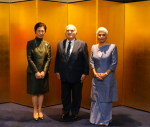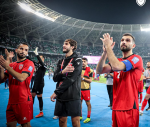You are here
Putin and Trump’s tainted love
Jul 06,2017 - Last updated at Jul 06,2017
US President Donald Trump must be giddy: this week, on the sidelines of the G-20 summit in Hamburg, Germany, he will finally meet his Russian counterpart and strongman-hero Vladimir Putin.
It is rare for someone who has reached the exalted office of president of the United States to retain the capacity for, much less interest in, hero worship.
But it is also rare — if not unprecedented — for someone in that position to owe so much to a single foreign leader.
For Trump, Putin’s likely intrusions in the 2016 presidential election may well have contributed to his victory, even as they have also done considerable damage to his presidency.
Trump expressed his admiration for Putin well before the election, and, it seems, fantasised about meeting him — a dream so potent, apparently, that it drove Trump to claim that he actually had, at the 2013 Miss Universe pageant in Moscow. (Before the pageant, Trump took to Twitter to ask his followers whether they thought Putin would attend, and, if so, whether he would be Trump’s “new best friend”.)
That story was debunked, but Trump was not ready to give up on his dream.
In 2015, he seemed to indicate that he and Putin had shared the “green room” on the US news programme 60 Minutes, for which they were both interviewed, though he quickly backtracked on those claims, as their interviews had actually taken place on different continents, which was easily verifiable.
Trump then claimed to have spoken to Putin by phone — a story he later revised to say that he had spoken with members of Putin’s inner circle.
In any case, Trump’s fantasy will now become reality.
But at a time when a special counsel is investigating whether Trump’s campaign colluded with Russia’s election meddling, lifting any of the sanctions, even the most trivial ones, that Barack Obama introduced to punish Russia for its interference in the campaign might not be the most sensible idea.
Yet there are whispers that Trump may do just that. And, given his tenuous relationship with sensibleness, such a scenario is not farfetched.
Were Trump to take that tack, Putin would of course have reason to celebrate. But short of such an outcome, one must ask whether, from Putin’s perspective, Russia’s apparent efforts to help Trump get elected have paid off.
Trump is certainly sowing chaos across the West.
Russia’s generals, we can assume, rejoice each time Trump refuses to endorse NATO’s Article 5 — the alliance’s bedrock collective defence clause — and instead poisons the alliance by railing against its leaders for their inadequate defence spending.
Trump’s disagreements with German Chancellor Angela Merkel — who declared after the G-7 summit in May that the US can no longer be considered the “reliable partner” it once was — have also fuelled deep uncertainty.
Left to lead efforts to resolve the ongoing crisis in Ukraine, Germany no doubt is feeling somewhat exposed — and Russia is feeling somewhat heartened.
But Trump’s evident belief in the chaos theory of government is, overall, probably not good for Russia, especially at a time when its economy, after three years of sanctions and low oil prices, is gasping for air.
Putin is failing to uphold his end of a tacit bargain with the Russian middle classes — “you keep quiet, and I keep improving your lifestyle” — and the resulting disquiet is increasingly on display on the streets of Russia’s cities.
Another source of uncertainty is the last thing that Putin wants or that Russia’s economy needs.
Of course, it is unlikely that growing dissent will dissuade Putin from standing for reelection next spring. In fact, he probably feels that he has little choice but to remain president for the rest of his life, for the sake of his own safety.
But without that all-important bargain — which provided Putin with a kind of legitimacy more durable in Russia that any vote could ever be — it will become increasingly difficult to keep the various factions of the Russian elite in line.
Instead, those factions’ ever-suspicious members may well begin to question the long-term viability of the system that Putin has constructed.
No one knows what will happen as those questions attract more attention.
In 1998, a year before Putin first became president, few outside Russia — or within the country, for that matter — had ever heard of him.
It was the implosion of Boris Yeltsin’s legitimacy in his last year in office that put the thin-skinned ex-KGB colonel on Russia’s political map.
At the root of the affinity between Trump and Putin is the sense that both are essentially strongmen.
But that affinity — and their relationship, whatever it may be — could be what weakens them.
Just as Putin’s interventions in the US presidential election have undermined Trump’s presidency, reflected in record-low approval ratings, Trump’s chaotic behaviour has damaged Putin’s position, already undermined by his own economic mismanagement.
Putin must now look over his shoulder even more often — for challenges from the street and, perhaps, for challenges from within.
At the upcoming G-20 summit, Trump should savour his long-awaited handshake with Putin.
Before long, both Trump and his autocratic hero could be regretting that they ever sought each other out.
The writer is professor of international affairs and associate dean for academic affairs at The New School and a senior fellow at the World Policy Institute. ©Project Syndicate, 2017. www.project-syndicate.org












